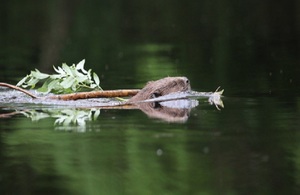Five-year beaver reintroduction trial successfully completed
Defra to consult on the management of beavers in the wild and national approach for any further releases later this year.

The trial has bought a wealth of benefits to the local area and ecology
The government has today (Thursday 6 August) hailed the success of a five-year beaver trial on the River Otter in Devon, recognising its benefits to the local area and ecology.
First licensed for release into the River Otter by the Devon Wildlife Trust (DWT) in 2015, two family groups of beavers have now successfully bred and dispersed throughout the catchment with up to 15 territories and 28 dams.
The five-year trial has bought a wealth of benefits to the local area and ecology, including enhancing the environment at a local wildlife site, creating wetland habitat and reducing flood risk for housing downstream.
They will now be allowed to remain there permanently and continue to expand their range naturally, finding new areas to settle as they need.
Today’s confirmation of the successful completion of the trial follows assessment by Natural England and consideration by Ministers of a recent report undertaken by the University of Exeter and partners on a five-year study into the impact of beavers into the wild in England.
On a visit to the project, Environment Minister Rebecca Pow said:
Thanks to the hard work of the Devon Wildlife Trust and their partners, the River Otter beavers reintroduction trial has proven highly successful - improving biodiversity and water quality, mitigating flooding and making the local landscape more resilient to climate change.
We are firmly committed to providing opportunities to reintroduce formerly native species, such as beavers, where the benefits for the environment, people and the economy are clear.
But we also understand that there are implications for landowners, and take care to ensure that all potential impacts are carefully considered, and today we can confirm a new government consultation on our national approach and management will open later this year.
The five-year trial run by the DWT and licensed by Natural England ends on 31 August 2020. Later this year, the government will consult on a strategy for the management of beavers in the wild and the national approach for any further releases. In light of this, Natural England will not be licensing any further releases in the wild until after the formal consultation has completed and consideration given to the responses.
Natural England will be engaging with key stakeholders regarding the management of beaver over the coming months to inform this approach.
Natural England chair Tony Juniper said:
The River Otter trial has been a brilliant success, thanks to the professionalism and dedication of the team at Devon Wildlife Trust and Natural England scientists who have worked with them.
This work, carried out under a licence issued by Natural England, has confirmed the positive transformations that these animals can create, including the benefits they provide for many other species, such as fish, improving water quality and smoothing flood peaks.
Reintroductions of iconic species like the beaver will be an important part of the Nature Recovery Network. We now look forward to working towards the next stages of management of beaver more widely across England.
Peter Burgess, Director of Conservation at Devon Wildlife Trust, said:
This is the most ground-breaking government decision for England’s wildlife for a generation. Beavers are nature’s engineers and have the unrivalled ability to breathe new life into our rivers. Their benefits will be felt throughout our countryside, by wildlife and people.
At Devon Wildlife Trust we’ve worked hard with our partners and local communities along the River Otter over the past five years to see what impact beavers have had. In that time their population has grown steadily so that they have successfully colonised nearly all of the river’s catchment.
As their numbers have grown so has local people’s awareness and appreciation of them. We’re delighted that these beavers have now been given leave to stay permanently.
As outlined in our 25 Year Environment Plan, the government is committed to providing opportunities for the reintroduction of formerly native species, such as beavers, where there are clear benefits, as part of wider efforts to leave the environment in a better state for generations to come.
The government is developing a new Environmental Land Management scheme which will help to deliver the wildlife goals in our 25 Year Environment Plan. This scheme will reward farmers and land managers for delivering environmental measures, including the provision of habitats.
Beavers were once native to Britain but were hunted to extinction around 400 years ago.